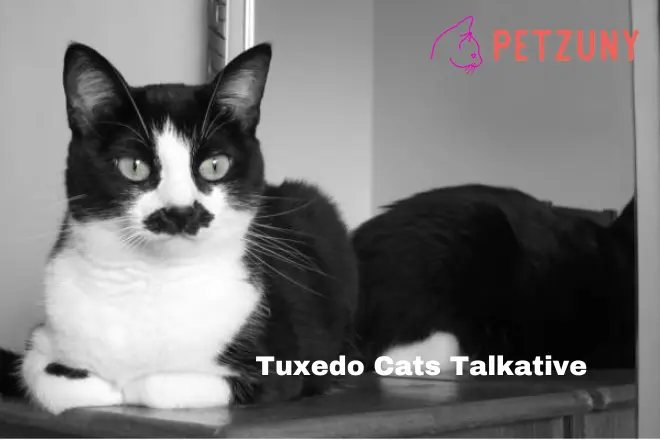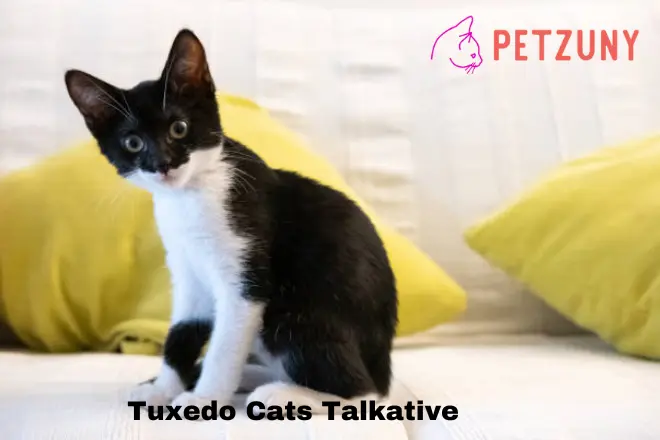Introduction:
Tuxedo cats, with their distinctive black and white coat resembling a formal tuxedo, have captured the hearts of cat lovers worldwide. Beyond their striking appearance, many cat enthusiasts wonder about their personality traits and vocalizations. Are tuxedo cats talkative? This article delves into the intriguing world of tuxedo cat behavior, exploring their communication patterns, factors influencing their vocalizations, and tips for understanding and responding to their meows.

Understanding Tuxedo Cats:
Before diving into their talkativeness, it’s essential to understand the nature of tuxedo cats. These feline companions are not a specific breed but rather a color pattern found in various breeds, such as the American Shorthair, Domestic Shorthair, and even some purebreds like the Maine Coon. Despite breed differences, tuxedo cats share certain personality traits, including intelligence, playfulness, and affection.
Vocalizations in Cats:
Communication is crucial in the feline world, and cats use various vocalizations to express themselves. Meowing is one of the primary ways cats communicate with humans, but the frequency and intensity of meows can vary greatly among individual cats and breeds.
Are Tuxedo Cats Talkative?
Tuxedo cats are known for their sociable nature and are often described as vocal companions. While talkativeness can vary from one cat to another, many tuxedo cat owners report that their feline friends are indeed quite chatty. These cats may engage in frequent meowing to seek attention, express their needs, or simply communicate with their human companions.
Factors Influencing Talkativeness:
Several factors can influence the talkativeness of tuxedo cats:
- Personality: Like humans, cats have unique personalities, and some may be naturally more vocal than others. While some tuxedo cats may be outgoing and gregarious, others may be more reserved and less inclined to vocalize.
- Environment: The environment in which a cat is raised can also impact its vocalizations. Cats living in quiet households with plenty of social interaction may be more talkative, while those in busy or stressful environments may be quieter.
- Breed Characteristics: Although tuxedo cats come in various breeds, certain breeds are known for their vocal tendencies. For example, the Siamese and Burmese breeds are renowned for their vocalizations, and tuxedo cats with these breed influences may inherit their chattiness.
Understanding Your Tuxedo Cat’s Vocalizations:
As a tuxedo cat owner, it’s essential to pay attention to your feline friend’s vocalizations to understand their needs and emotions better. Here are some common meow types and their potential meanings:
- The Attention Meow: This meow is typically short and repetitive, indicating that your cat is seeking attention or interaction. Responding with affectionate gestures or playtime can satisfy your cat’s need for attention.
- The Food Meow: Cats are known for their love of food, and this meow is a clear signal that your cat is hungry or eager for a meal. Providing regular feeding times and nutritious meals can help curb excessive food-related meowing.
- The Distress Meow: A loud, intense meow may indicate that your cat is in distress or experiencing discomfort. It’s essential to investigate the cause of distress, such as injury, illness, or anxiety, and seek veterinary care if necessary.
- The Contentment Purr: Purring, not a meow, is a cat’s vocalization. A deep, rhythmic purr indicates that your cat is content and relaxed, often occurring during cuddle sessions or grooming.
Tips for Responding to Your Tuxedo Cat’s Vocalizations:
- Pay Attention: Take the time to listen to your cat’s vocalizations and observe their body language to better understand their needs and emotions.
- Provide Enrichment: Engage your tuxedo cat in interactive play sessions, provide toys and scratching posts, and create a stimulating environment to prevent boredom and encourage mental and physical exercise.
- Establish Routine: Cats thrive on routine, so try to establish consistent feeding, play, and grooming schedules to provide structure and security.
- Seek Veterinary Care: If your tuxedo cat’s vocalizations suddenly change in frequency or intensity, or if you notice other concerning symptoms, consult your veterinarian to rule out any underlying health issues.
Conclusion:
Tuxedo cats are valued for their talkative, sociable nature. While talkativeness can vary among individual cats, many tuxedo cat owners enjoy engaging in lively conversations with their feline companions. Understanding vocalization factors and responding to meows strengthens the bond with your tuxedo cat, promoting well-being and happiness.

